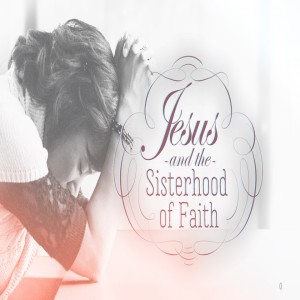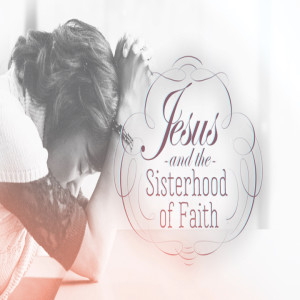Episodes

Tuesday Jun 04, 2019
Tuesday Jun 04, 2019
Jesus and the Sisterhood of Faith- “Get the One Thing Right”
(Luke 10:38-42)
Happy Graduation Weekend! We are studying the five unique encounters between Jesus and women in the Gospel of Luke. Today’s focus is about two sisters, and getting “the one thing” right. What is the one thing? Grads and everyone else: nail this down and settle this priority today!
Jesus’ travels led to interesting hospitality conversations (v.38).
The sister’s home is in Bethany near Jerusalem (Jn.11:1; 12:1).
This may be the first time Jesus visits (but not the last!).
Jesus displays a radical shift in discipleship practice (vv.38-39).
He includes & teaches women as disciples. Seismic “WOW” moment!
Like many women in Jesus’ day (& today), Martha & Mary had primary
domestic, hospitality, and care responsibilities in their home’s.
Such a high calling is admirable and necessary.
Unless, Jesus counsels, it interferes with a higher priority and privilege.
Jesus encounters the differences between the Sisters (vv.39-40)-
Mary: takes full advantage of the opportunity: Mary’s “Elf” moment!
“sat @ the Lord’s feet listening...” (v.39).
Martha: “distracted, worried, upset” (vv.40, 42); she accuses & even
commands Jesus to advocate for her sister’s help (v.40)!
Simply put, Mary gets it and Martha wants it, but is missing out on it.
Jesus teaches us to choose what is best over what is good (vv.41-42)-
Why is Mary’s choice better? (RT France):
*Embodies the 1st and greatest commandment (IHM): “Love the Lord...”
*Devotion > Hospitality: “We serve best when we love God most” (Stein).
*Jesus, the subject/object of our soul’s worship, matters most.
*Jesus is our portion, the better part (cf.10:25, inherit-chosen connection)-
Settle this priority... Jesus matters most! (v.42)-
Nail this down: “one thing is necessary...” (it’s not taken away!)
Share time & learn from Jesus (Luke 10:39, 42). You need it! We all do!
1 thing: devotion and zeal for your relationship w/ Jesus!
Your relationship w/ Jesus transcends other good commitments.

Tuesday Jun 04, 2019
Tuesday Jun 04, 2019
Jesus and the Sisterhood of Faith
“Participants in Kingdom Purposes"
(Luke 8:1-3)
Happy Mother’s Day! Luke highlights the unique role women actively shared in the daily ministry of Jesus. They were followers of Jesus, transformed by His ministry. They had a supportive, equipping role inclusive with the 12 disciples. They used their financial resources to support Jesus and further His ministry. Who are these women? What can we learn from them about participating in Kingdom purposes today?
Jesus actively traveled during his ministry (8:1)- purposeful wandering
Jesus was “... a sojourner on the move” (EEE)- road trippin’!
His entourage included the 12 disciples “and also some women” (v.1).
Jesus elevated their role by including them in the traveling band.
“Adult co-education was unheard of” (C.Keener).
Who are these Women (8:2-3)? Luke honors them by naming some:
Mary (Magdalene)- had 7 demons cast out!
Joanna- the wife of Cuza, manager of Herod’s household (healed?)
Susanna- no other known info (restored somehow?)
Many others... (lives changed by their faith in Jesus!)
Lessons We Learn from the Sisterhood of Faith
Partner willingly- we are co-laborers with a collective responsibility.
They were participants in Kingdom purposes.
Serve energetically- “were ministering” (v.3)- constant, on-going.
They were providing, supporting, and helping however it was needed.
Luke uses the picture of serving like table waiters: eager, responsive.
Sacrifice mutually- “out of their own means” (v.3)- “receive/give” (Bock).
Witness gratefully and boldly- with Jesus in His daily ministry; followed
him to the cross, to the tomb, and then, they were the first evangelists
of the resurrection! “Hear the Word, Spread the Word” (T. Anyabuile).

Tuesday Jun 04, 2019
Tuesday Jun 04, 2019
Jesus and the Sisterhood of Faith
“Love Much”- Jesus Anointed by a Sinful Woman at the Pharisees’ House
(Luke 7:36-50)
In the 1st century world, women were taken advantage of by men engaged in the sex trades. Such women were especially maligned, vulnerable, abused and shamed. Jesus encounters such a “sinful” woman at a dinner party in the home of Simon, a Pharisee. She anoints Jesus’ feet with tears and expensive perfume. Jesus forgives her sin and pronounces her faith has saved her as evidenced by her great love for Him (vv.47-50)! But, what of the Pharisee? Or, us? Have our sins been forgiven? Do we love much?
Who is this woman? Why is she called “sinful”?
She is a woman; created in the image of her Creator (7:37; Gen.1:26).
She is a sinner, one who has missed the mark and fallen short of God’s
standard of glory/holiness/righteousness (7:37; Rom.3:23).
She is allegedly known as a sex worker/prostitute (7:37, 39).
She has access to wealth (alabaster vial of perfume, 7:37-38).
She is a humble risk-taker; expressing great faith in Jesus (7:37-39).
She is repentant, expressing great love for Jesus (7:44-47).
She is forgiven by Jesus and saved by Him (7:47-48, 50)!
She is blessed by Jesus (into His peace/shalom; 7:50).
Who is this man (the Pharisee)? Why does he think he’s not “sinful”?
He is a man; created in the image of his Creator (7:36; Gen.1:26).
He is a Pharisee; a religious leader, who has authority/wealth (7:36).
He is a sinner, one who has missed the mark and fallen short of God’s
standard of glory/holiness/righteousness (7:39; Rom.3:23).
He is not as holy or sharp as he thinks he is (7:39, 44-46).
He correctly answers Jesus (7:40-43), without insight or repentance.
Who is this Incredible Jesus? How can He forgive sinful people?
He is a hungry guest at a banquet (7:36-37).
He is a Teacher/Story-Teller Extraordinaire (7:40-43)!
He is an equal-opportunity Forgiver (7:47-49) because He is God!
He is our Peace-Giver (7:50)!
Who am I? Will Jesus forgive my sins too? How will I “love much”?

Monday May 13, 2019
Monday May 13, 2019
Jesus and the Sisterhood of Faith
“Give Back”- Jesus Has Compassion for a Widow in Nain
(Luke 7:11-17)
The Gospel of Luke shares five unique encounters Jesus had with women. Women in Jesus’ day were de-valued and marginalized. Jesus esteemed and elevated women in His ministry. He notices a grieving mother, who is also a widow, and in an act of compassion, He gives her son back to her.
Jesus empathizes with a grieving widow (7:11-13). Empathy broadens our view of ministry. Jesus has a high EQ: “His heart went out to her.”
Widows were socially and economically vulnerable in Jesus’ day.
Even more so when the only son of a widow dies as the primary
provider and protector for his mother.
Jesus meets her during the funeral procession. “Don’t cry”, he says.
Perhaps, he thinks of what it will one day be like for his own mother.
Jesus acts to relieve her grief (7:14)- ministry acts to relief misery.
This passage is one of three resuscitation stories in the Gospels
(raised from the dead to die yet again; cf. Mk. 5:21ff; Jn. 11:17ff).
He approaches and touches the coffin.
He speaks publicly to a dead man: “Young man, I say to you get up!”
Jesus models a ministry of giving back (7:15)- He restores and gives
back this son to his mother.
Jesus shows that ministry motivated by compassion looks for ways to
meet pressing needs and give back in meaningful ministry.
Jesus’ ministry echos both the prophets Elijah and Elisha (1 Kings
17:17-24; 2 Kings 4:18-37). No wonder the crowd calls him “A
great prophet” (v.16).
Jesus’ ministry reflects His power over death and the grave, and
ultimately serves as foreshadowing to His resurrection.
Jesus’ ministry has multiple results (7:16-17)-
Awe: People were filled with awe.
Praise: God is praised by the people.
Testimony: acknowledge Jesus is a great prophet.
Prophecy fulfillment: God has come to help his people.
Ministry Expansion: Word spreads!

Monday May 13, 2019
Monday May 13, 2019
Conversations- Overhearing Jesus Talk with People on Their Journeys
The Women of Easter- “Why Seek the Living among the Dead?”
(Mt.28:1-10; Mk.16:1-8; Lk.24:1-12; Jn. 20:10-18)
He is risen! Early on the morning of the first Easter, women are the first to seek and speak with Jesus. As they discover, encountering Jesus alive changes everything, including the trajectory of our journeys!
Easter is... the celebration of the resurrection of Jesus!
Jesus died, was buried, rose on the 3rd day & appeared (1 Cor. 15:4-8).
Easter means... We have hope! We can be forgiven! (Rom.5:2; Eph.1:7)
We are deeply loved! (Rom.5:5, 8)
We have peace with God through a relationship with Jesus (Rom.5:1)
God has accepted the ransom Jesus paid with his life for us (Mt.20:28).
Easter changes... everything! (especially, the trajectories of our lives.)
Experiences and Conversations of the Women of Easter
Women seek- They walk to the gravesite to perform burial rights.
They talk about the stone blocking the entry.
Angels announce-The tomb is empty: Jesus lives! “the Living One”
Go quickly and tell the disciples.
Jesus appears/speaks- greetings of peace, “stop fearing”
Go tell disciples. Shares travel plans!
Women share- They tell what they have seen and heard!
The disciples are responsible to respond.
We can trust the testimony about Jesus’ resurrection because:
Eye witnesses (reliability)- dependable, consistency in reports.
Empty tomb (validity)- constant, authentic, conclusive witness.
Early testimony (veracity)- trustworthy, honorable, accurate testimonies.
Exchange- transformed lives! Jesus changes us, never to be the same!
Empowerment - power to be and do great things for the Kingdom!
Invitation: Will you believe? Will you be a witness? Will you serve the risen
Lord Jesus and His Kingdom?

Monday May 13, 2019
Monday May 13, 2019
Conversations- Overhearing Jesus Talk with People on Their Journeys
“Jesus Initiates a Different Kind of Conversation”
(Mt.21:1-11)
Today is Palm Sunday, ushering in Passion Week, leading up to Easter.
As Michael Card notes, we paradoxically celebrate Jesus’ suffering on our behalf. Jesus has come to Jerusalem to die (Mt.20:28). He gives prophetic instructions, initiating a different kind of conversation: as a king to be honored and praised, yet as a suffering servant, giving his life for us.
Lessons from Jesus Conversation
A prophetic word- centering on who Jesus is (21:1-5; Zech. 9:9)-
Notice: Jesus initiates the conversation approaching Jerusalem (v.1).
He engages the disciples in a story that was much anticipated as a
fulfillment of prophecy by the Messiah (vv.1-5)
Just as He has told them he was coming to Jerusalem to die, He now
also reveals himself as a peace-bringing king.
Center your conversations with others on who Jesus is.
A symbolic word- representing who Jesus has come to be (21:6-8)-
Jesus is enacting the fulfillment of prophecy (vv.6-8).
The disciples are living out the story! They are walking in living history!
This symbolic act points to Jesus as being the Messiah.
What symbolic acts do we participate in which reflect our believe in
Jesus as the promised One from God?
Conversations about our baptism and observing the Lord’s Supper are
helpful to describing our relationship with Jesus and His people.
How do we respond to Jesus? Worship - acknowledging/receiving Jesus as King (21:9-11; Ps.118:25-26).
The crowd responded to Jesus’ entry as if receiving a King (v.8).
They laid down cloaks/palm branches as an offering of worship (v.8).
They expressively shouted/praised Jesus (v.9), quoting from a favorite
song they would sing at Passover (Ps.118). They worshipped Him!
How do you respond to this prophetic conversation (vv.10-11)?
What do you say to Jesus in response to the revelation of who He is?
Who (or what) receives your praise and worship?

Friday Apr 12, 2019
Friday Apr 12, 2019
Conversations- Overhearing Jesus Talk with People on Their Journeys
“Zaccheus- A Wealthy Outcast is Brought into the Family”
(Luke 19:1-10)
Jesus takes his last walk from Jericho up to Jerusalem. He has told the disciples why he was going and what would happen there (Lk.18:31-34). Going through town, Jesus notices a man up a tree and invites him to share time together. What can we learn from overhearing/observing how Jesus connects with this man in conversation?
Lessons we’ve learned from Jesus’ Conversations (Powerpoint only)
Listen w/ interest like you’re truly interruptible.
Respond w/ gentleness even to selfish ambition.
Huddle up w/ purpose to focus on the mission.
Willingness to connect with all kinds of people.
Openness increases connection.
Make room for others along the journey.
Learning from Jesus’ Conversation
Who is Zacchaeus? Why his story? (19:1-4)- Jesus welcomes outsiders!
A man, called “a chief tax-collector”
“wealthy” (traitor, oversees collecting Roman taxes)
described as “short”, wants to see Jesus (wealthy, but wants)
resourceful (runs, climbs a tree to see); open to invitation
eventually called “a son of Abraham” (faith)
Take a moment to notice people (19:5-6)- What’s going on around you?
Read non-verbal cues (93% of communication)
See what others miss (insight into Jesus’ view)- providence!
Consider an invitation to spend time together (19:6)- make it happen!
Jesus had a destination that day, but He took time out for a break.
Jesus initiated & called him by name! He invited the outsider, who
gladly responded. Grace-extended!
- is a part of the divine mission of Jesus (“I must”- moral necessity)
Make room for surprise endings and celebrations (19:7-10)-
Crowd- mutterers/grumblers, a friend of (the chief of) sinners (v.7)!
Zacchaeus- accepts invitation, responds to Jesus: “stands up” and
makes a vow of restitution to Jesus as a sign of repentance (vv.8-9)!
“A thank offering from a changed heart” (EEE). Grace received!
Jesus- celebrates seeing his mission fulfilled in this lost sheep coming
into the fold. No content of the conversation, but the outcome (v.10)!

Wednesday Apr 10, 2019
Wednesday Apr 10, 2019
Conversations- Overhearing Jesus Talk with People on Their Journeys
“Bartimaeus- A Man without Sight Talks with Jesus and Sees”
(Luke 18:31-43)
Jesus takes his last walk from Jericho up to Jerusalem. He has told the disciples why he was going and what would happen there (Lk.18:31-34). Jesus is interrupted entering the city by a man who is blind and wants an audience with Jesus. What can we learn from overhearing/observing how Jesus connects with people in conversation?
Learning from Jesus’ Conversation
Who is Bartimaeus? Why his story? (18:35-39; cf. Mk.10:46-47)-
Man (“daily wonders why/what he did to deserve this.” M.Card)
described as blind, poor, asking for alms @ the entry to the city.
inquisitive, opportunistic, stubborn, undeterred (go 4 what you need)
insightful (by how he describes Jesus)- this is his moment! Persistent!
Willingness to connect with all kinds of people (18:40)- (cp/ct Ch.18-19)
Maybe the announcement of truth about His identity grabs His attention?
“Jesus, son of David, mercy...” (vv.38-39). Mercy = gift undeserved.
Jesus stops. Man sees Jesus as Messiah even before he is healed (EEE)
Jesus orders the man over to him. “Jesus always ready to serve.” (Bock)
Jesus waits for him: “When he came near...”
Openness increases connection with people (18:41-42)
Jesus talks to him. He asks a simply profound question.
Simple question: “What do you want me to do for you?” (v.41)
Simple request: “Lord, I want to see.” (Acknowledge need for help!)
Miraculous responses: 1) “Receive your sight.” (“See!”)- immediacy
2) “Your faith has healed (saved) you.” (“Faith is key!” -Kenner)
Faith is how (means) the healing can happen (Morris).
Seeing Jesus for Who He is changes everything!
Make room for people to join you on the journey (18:43)- Praise party!
Faith leads to following... this is the path of being a disciple.
“Glorifying God”- seeing the Messiah’s work brought glory to God!

